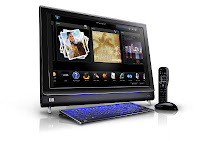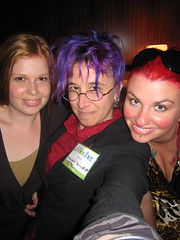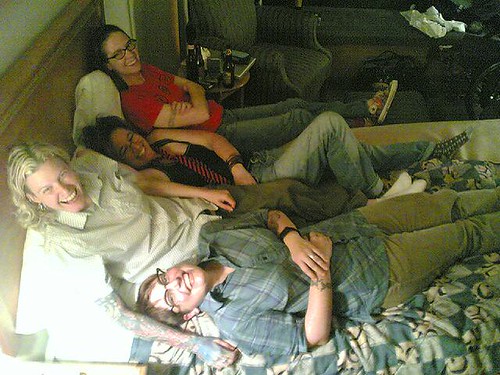I’m at the She’s Geeky conference in Mountain View, and I’ll be liveblogging in very raw format. Later this week I’ll come back and clean up this post to make it more coherent and to take out the typos and add links.
I’m having a great time here. There is a very pleasant spectrum and range of people who are sort of hard core programming or hardware geeks plus the web 2.0, entrepeneur, blogging, marketing crowd. So it’s a great mix for me. People in general seem excited and inspired! The Computer History Museum is gorgeous, and I can’t wait to come back and go through it all. It is also a great place to have a conference.
*****
Open source lunch table conversation
Tori Orr, Susan Gerhart, Liz Henry, Ursula Kallio, Kim Wallace, Akkana, Margaret Rosas.
Open source stuff we talked about: Ubuntu 7.10, Drupal, LAMP in general, Joomla, Drupalcamp, Linuxchix, Ubuntu Women, the recent O’Reilly series, Python
Someone (someone who is a marketing person) was saying that we need to do more marketing for open source, joomla is marketed better, more consumer accessibile. Businesses aren’t realizing how valuable open source stuff is, they haven’t realized it yet. They don’t know how to listen to something without an authority figure or a hierarchy they can recognize. Also it is not made slick enough for them. But when it is, they’ll go for it.
Someone else mentioned wishing that there was an open source enterprise-level shopping cart.
Kim W. drew us diagrams to explain her release process for her company, which was pretty interesting for me because I was just going through the whole release process at mine.
Akkana talked about having a hackday and said to talk to Gloria W. about grrlcamp and other events.
I met Gaba, who was there with her 6 month old baby, and who talked about working for crabgrass, and about programming.
Also, Ursula and her partner Wiebke, I think both programmers but now I can’t remember what they do.
Someone else, I think Tori, talked with me about librarians and wikis, librarians and CMS, people still trying to figure out tech and cms. We agreed that people don’t realize the depth of the problem of managing knowledge, keeping and maintaining and using it. It is not a trivial problem! I had an idea: exposing the dead links in your years of blogs. How about an app to do that and then helps you find a live link for those dead link, in the internet archive AND other places. This would be a really great application. It should be built into ecto and other multiplatform blogging clients.
Another idea we talked about: make Moodblast do your location. Or something to let you talk to Doppler very quickly to update your location. General agreement from half the table that Dopplr is slick, and ears perked up around the other half of the table. (This was the case in nearly every conversation I was in, all day!)
Kaliya’s opening intro.
She mentioned some Stanford researchers – researching US. and reporters, like Mike – our “guy” from the San Jose Mercury News, plus Karen, the photographer
Julie from Wired News was also mentioned and got a huge cheer
c.?? from GigaOm (I did not hear her name.)
Kaliya mentions that the lunch trash is all compostable – but we need to find someone to take it somewhere that they compost stuff. Anyone ? Someone from google volunteers. Oh, California, where else would we find this funny and sweet and wondrous behavior?
Susan Mernit talking now, about Lillian (last name?) in animation in the 1930s, refused entry to animation school because women don’t do that sort of creative work.
What’s changed and what hasn’t? Things are shifting. We’re here at this moment in time. Yet they are not shifting enough. We are in an unbalanced environment, seen as an exception, exception b/c of being an engineer, doing back end work, or because of things like having to take care of everyone on the team. Everyone’s really comfortable if you do that, but if you don’t you’re the bitch. “You’re so amazing you’re not one of those tight sweaters” “what?” you now those really cute girls who work in pr and marketing… or “put your name on it or no one will believe you contributed.” or “Hey how did you come to be (engineer)” etc. or “Are you married? What does your husband think” These aren’t the reasons we’re here today, but this is an environment we all function in. We do it to each other and ourselves too; we have to fight to be as comfortable as we are.
Here we get to really talk, Linux, back end, systems, biotech, whatever you are passionate about. Also our stories of things we have to deal with.
Question from audience: Is anything being recorded? Can we watch this later? (Answer: Maybe – the videobloggers here are doing some recording.
Nonprofits session
Beth Kanter – circuit rider, learned html early, started blogging to keep a work log of things fixed
Elizabeth Perry – works at a school – accidental techie – came out of feminist literary theory background. School environment, adoption, you get computers but teachers aren’t sure how to make use of it. Inefficiency, confusion, concern. Elizabeth wrote a tech plan, interviewed to get best practices, then got a job doing that development, how to use tech to develop curriculum. New ways of using tech. Tech evangelist, one on one to help teachers use technology in their teaching. Technology integration specialist.
Beth: shoulder to shoulder learning
Eliz: ideal for people who love projects and learning new things. Teachers don’t know the tech but are great learners. What was cool for you in middle and high school? What can we do for girls? Eliz’s background is in community organizing.
Beth: the role of translator, an important skill.
Ursula K. Music industry, help musicians promote with tech.
EP: look at higher education and doing a gig teaching a course in how to do this.
Beth K: Webinars, for Rockefeller Foundation, supporting independent musicians, the business of music. Beth was out looking for people who work with musicinas and taught those things.
Ursula: often the valuable thigns are the Small details like don’t send a jpg that’s more than 120 pixels wide because it will give a bad impression.
Beth Cameron – sacramento. started out as admin asst and ended up doing al the techie stuff like setting up networks and fixing computers. getting peopel on listsev. Califo assoc. of health facilities. every time i go to any sort of training or anything I”m one of 2 women if even.
Beth K: it’s an important point, small interventions go a long way. the flip side is that there is a lot of resistance and adoption issues.
EP: I just learned this thing last year! Why do I have to learn another thing!
Beth C: Change is hard. And our org is mostly female except for the CEO of course (laughter) a little cynicism, glass ceilng… So I teach people how to send their first email, how to blog, back with AOL. Try gmail! and so on.
EP: they are passionate about something other than technoogy. because their mind is not on that they make careless or foolish mistakes and therefore they get really frustrated, and so it’s like therapy, lowering their stress level around technology. creating passionate users. those rewards, like video gamers levelling up rewards, kathy sierra. first you show them the blog entry, then the microphone, hey you could record something.
BK: You can’t overwhelm them, can’t use any jargon.
Akkana: takng time off from Silicon Valley rat race, looking for something more worthwhile. I know women who work in np as sys admins. I’m more of a programmer. Is there a space for things other than sys admin?
BJ Wishinski: quit high tech job to work for year for anita borg (wow) Grap
hics programmer, manager of education services around technogoloy. Software for designing integrated circuits. one of the more masculine ends of tech you can possibly be in. i’m so tired of that enviornment that I don’t want to go back. so I gave notice. I just went from grace hopper conference to here, to anita borg, now I have a year to figure out a paying job doing something to build support structures for women in tech industry and a new career
susan gearhart: interested in baby boomers who are going to be losing vision. I have a vision loss program. as i’ve been goin ghtrough this transition I am understandng what boomers will need from technology. women who could get together to develop assistive tech that in an open source mode . then, t here are other really great tech ideas but theya re really 2 or 3 generations behind. how can we bring that new stuff into the attention of the rehab organizations that work for states, counties, schools, to make much better tech available for everybody of all ages. Is there an org anywhere, or way to form one, develop better assistive tech. Existing rehab organizations.
BJ: Center for Independent Living?
Susan: Bookshare
Liz: no really awesome ones around.
blond woman: boomers, next phase, silver something. using tech, patents. “Hearrings” earrings that are hearing aids.
(We all get rather excited about Hearrings. Fancy hats with veils and flowers with all that stuff built in…)
Susan’s blog:
me: I worked in K-12 school, universities, in tech. worked in search at excite, back end, perl, went off to get degree in comparative literature and translation, blogging, blogher, now at socialtext, wiki software, i manage the open source release of this wiki software . pbwiki, socialtext, wikipatterns could be very useful for educators and nonprofits. I love what Beth said about the small interventions.
Beth: watch people work, see how you can intervene.
Wiebke Mueller, from germany. accessibility, e-learning. training people on computers, web developer, trainer.
Liz: This site, a woman I met at BlogHer, keeps this blog which explains step by step everything you have to do to make a blog accessible, on various blogging platforms.
http://allaccessblogging.com
BJ: also interested in access. We are all going to be disabled at some point if we live long enough. Older people using email and the web more.
Wiebke: Dragon, it has become much better in version 9.
Anne Holden: Science education, communication. http://www.natcenscied.org/default.asp
Describes many issues of nonprofits and education. Donors, grants, professors. If there’s a big court case we get a lot of press and then new members. Was working in research, thought the profs aren’t getting their research out there enough for the public.
Amy Jussel – new media, non profit, non partisan, creative director. It’s all about content. “Shaping youth” is her blog. Girls for a Change (conference?) Her background is CEO, productize this, make it open source, get it out there. Viral, counter-marketing, constructive. Readergirl. I get offers from companies who want to sponsor, but they just want my people. Kraft Foods, Walmart, all the biggies that are trying to change their colors but I’m a little cynical. I’m Trader Joes not Walmart. I’m looking for advice, how to integrate positive media but maintain an indy voice, how to be nonprofit, and open source, as a social entrepeneur.
EP: New Mexico media literacy group. Be afraid, be very afraid. Critical consumers.
BJ also mentions Girls for a Change. The girls really take it into their own hands, make a web site, put stuff on YouTube.
BK: about being an entrepeneur, are you workingn with a non profit?
AJ: I am a nonprofit.
BK: so you’re frustrated with the structue you set up?
AJ: Have easy turnkey kits for teachers to download. then i decided, why charge 50 bucks for this? why not make it free and open source?
BK: have a small board, that can work really well, you can then move faster
AJ: we could go after grants, i dunno, the blogs become time sinks. be a vital resource, but pay the bills. how not to have big folks declare they’re your partner and not take you over.
Abbey Patterson: company is Sooner. duke, harvard, partnership, unesco, columbia, healthcare. Music, hip hop.
I have lost the thread of what Abbey is talking about.
Katie – free technology services to small grassroots nonprofits. just getting a web site, the over the shoulder learning, etc. grassroots.org
American Cancer Society –
The Click Heard Round the World – Rickomatic – MacArthur, nonprofit and best practices paper.
Lightning talks. Danese
Slides are online:
* be clear what you are talking about
* don’t think of yourself as a public speaker, it’s regular conversation
* humble and funny
* nothing bad is going to happen
* don’t overprepare. be real
* your audience wants you to succeed. watching you fail is excruciating.
what’s your goal? not necessarily there to say what you’ve been told to say.
* (I have more extensive notes on the lightning talks sessions which I’ll post on Thursday. I took notes on nearly all the 3 minute talks, and I gave a talk myself on How to Deal with It When You Don’t Know What To Do (about bugs, and applications not working, and failed installs, and broken computers) and another on How to Make Your Wiki Not Suck.)
* The extra time for eating and breaks was a fantastic part of this conference
* I got some fun stickers from google and firefox, and an O’Reilly tshirt
* I talked more with Danese which was super fun
* I talked about my workplace and what I do and demo-ed my wiki for people
* I hung out with my kick-ass sister, who is a web dev and blogger
* I also talked with Z. about open document format, she showed me some linux translation efforts which I marked to blog about later, and we talked about nooxml.org
* I caught the first bit of Heather Gold’s stand up comedy which was great, but I had to leave
* Did I mention, the food was good?
* I talked with 2 people from Atlassian, which was fun (their company also sells enterprise-level wikis)
* I promised lots of people cards and “Wiki Way” tshirts and more talking and information the next day when I would be less tired
* and there were so many people there I wanted to talk with, old friends and new people to meet
* BUT THEN that night I got nastily ill and spent the whole day 2 of the conference in bed throwing up. DAMN
* So I didn’t get to give the fun long version of my talk “How to Make Your Wiki Not Suck So Bad”
* I was very very sad about being sick and missing the rest of the conference
* Mad props to Kaliya and team for a great conference and a great job organizing!
* Note to self and others, go add your writeups and information to the wiki! Yes, this means you! Link them from either the Monday page, or Proposed Topics, or the nearly totally empty Notes page which I hope we will populate and organize. The main thing is to put up your notes. Someone else will come along and fix things and organize it later, that is what wikis are all about. But this was a great conference that deserves to have a record of what happened there set out coherently.
Technorati Tags: conferences, feminism, geeks, techie tools, women







